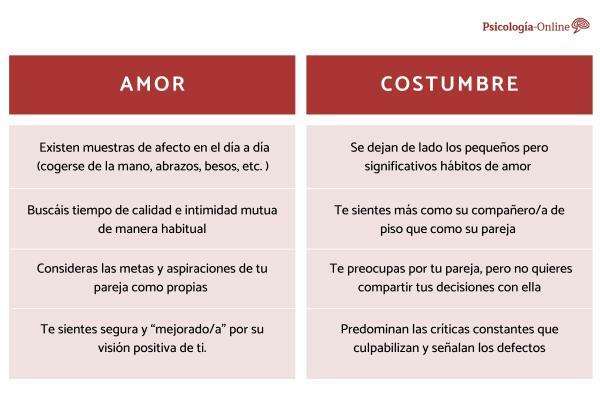
Gradually, romantic love has evolved from being an economic or social status alliance to become the place where both men and women seek meaning, transcendence, fulfillment, and ecstasy. However, when time passes and the first disappointments appear, it is usual to compare the small crises of the relationship with the myths of romantic love with which we have all grown up. The way to deal with these crises in the couple will define whether it will be a healthy relationship or not.
How can we know when it is mature love and when it is habit? Signs that someone is unhappy in a relationship and that their commitment is waning can come in many forms. In this Psychology-Online article, we will explain how to know if it's love or habit through different signals.
Index
- How to know if love is over
- There is emotional closeness in the couple
- Negative spontaneous reactions occur frequently
- you support each other
- Are you routine partners or lovers?
- There is no lack of affection and gratitude
- Do you consider your partner?
- it keeps surprising you
- there is sexual attraction
- You solve problems together
How to know if love is over.
On many occasions, love is conceived as "butterflies in the stomach" and when this intensity decreases and disappointments arrive, they begin to question if they are really in love or if their relationship has become bored. However, it is important to note that love is not linear and goes through several stages, from the initial attraction, the "honeymoon" phase, the disenchantment or disappointment until reaching real and mature love.
The phase of mature love is characterized by the feeling of tranquility and stability. According to dr. Carla Marie Manly “being truly in love with someone often feels like having a genuine friendship with the added bonus of continued attraction and sexual intimacy”[1]. therefore love not a permanent state of enthusiasm, but something that is actively cultivated and nurtured through actions that show the other person that they are important to you.
However, Maria Esclapez[2] warns us that many people tend to consider this phase as a boring stage of the relationship in which there is no love, but nothing could be further from the truth. There is still love, only that it is lived differently. In fact, it is in this phase where a faithful and true commitment is built and the deepest and most rational decisions are made. The couple looks like a point of support and communication, dialogue and negotiation predominate.

There is emotional closeness in the couple.
Do you feel emotionally close to your partner? Does your partner feel close to you? How often do you share your feelings with your partner? Does your partner share their feelings with you? These are some key aspects of the relationship, because when one person talks and the other listens intently, they offer validation and show that they care.
In a study led by Laurenceau[3] It is pointed out that the listener's responsiveness is essential for building a healthy relationship. In this way, when you no longer share your feelingswith your partner or you prefer to share them with another person, the relationship will decline. If this becomes a habit it could suggest that you are growing apart.
As the relationship solidifies, your feelings become deeper and you want to connect deeply with that person. On the contrary, when people begin to separate emotionally and stop exchanging their emotional world, this will be a sign that the health of the relationship is declining and love could be becoming a habit for not prioritizing the relationship.
Negative spontaneous reactions occur frequently.
We have conscious ideas about our partner, both favorable and unfavorable, but we also have implicit ideas about our partner. These unconscious views are rooted in the fundamentals of the couple and can be especially revealing about the state of a relationship. You can try to reflect on questions like, for example, what does your partner think of your attitude, how fun it is to be with you? What is your first reaction when your partner is wrong? Is there respect or is there a derogatory response?
A study from the University of Rochester[4]points out that the negative unconscious impressions of the partner, especially those who have low positive impressions and high negative impressions, may be at higher risk of breakup. Many couples fear breaking the circle out of habit, however, negative interactions will often weaken the bond and love.

You support each other.
Reactions to good news can give an idea of the quality of the relationship. For this reason, couples who perceive less constructive reactions to good news (for example, less enthusiastic, more destructive or passive) are more likely to break up in the coming months compared to those that hold genuine and strongly[5].
When you're not really in love with your partner, it's common to show little interest whenever difficult situations arise. This could create further distance and the relationship feels like a burden or routine rather than something valuable to take care of. In turn, you will wait for him to solve his problems and goals on his own, without taking on any of his burdens or doing everything possible to support him.
On the contrary, when you are genuinely in love with your partner you want to stay by his side In good and bad.
Are you routine partners or lovers?
Another way to tell if it's love or habit is when you start to lose interest after the crush or honeymoon and you don't feel the need to try to fix it and/or do more of your part (or that of your partner).
There are many ways to love someone, but saying that you love them "as a person" and that you are not "in love" often indicates that you see him more as a close friend, a routine partner, that you care about a lot than as a lover of whom you are in love. Yeah you feel more like his roommate that as your partner it can be a sign that you are not really in love and what you feel has become a habit.
People who are 'in love' give their partner time and attention. This means seeking quality time and mutual intimacy on a regular basis. Therefore, when you have a crush on someone, you are more likely to do whatever it takes to see and spend time with that person. Conversely, if you don't even feel like seeing your partner, you may not be in love.

There is no lack of affection and gratitude.
Related to the previous point, some couples find themselves trapped in a relationship that is more reminiscent of roommates than spouses. In these cases, small but significant habits are set aside of love, such as holding hands, hugging, kissing or sharing jokes, among other details that allow showing affection and creating happy moments in everyday life.
On the other hand, the lack of gratitude can be evidenced in constant criticism that blames the other person and reminds them of their defects without stopping. In healthy relationships, partners feel safe and "enhanced" by the other person's positive view of them.
For this reason, emphasizing the positive qualities of the partner and feeling grateful for having that person in our lives, however imperfect, can make all the difference.
You consider your partner.
Another way to know if it is customary or if you are really in love with your partner is to reflect on whether you take them into account in important decisions. In this way, you will find time to talk with him or her before making any momentous decision in your life, such as leaving work or moving, to make sure the outcome works for you. both. At the same time, you will see the goals and aspirations of your partner as your own and you will do everything possible to support her.
Conversely, if you care about your partner but don't want to share your decisions with them, it is possible that, although you appreciate them, you are not in love with them. In other words, you can want the best for your partner, but not to the point of having to make sacrifices that drain your time or energy.

It continues to surprise you.
In one of his studies, Fletcher[6] equates being in love with continuing to find new things to love about your partner, even after you've been together for months and years. Someone in love is filled with a passion that may wane, but will flare up again before it goes out.
In this way, it is considered that you are in love with your partner if you are continually renewing positive feelings for that person as awe, gratitude or respect and you are learning new things every day as time goes by. In these cases, you will feel that your love is always evolving in a good way.
Conversely, people who like each other because they are used to each other are more likely to break up or end up living in a toxic relationship, unlike those in love who always find ways to grow together.
There is sexual attraction.
On the other hand, if you enjoy spending time with your partner but you are not attracted to her, it is possible that you are not really in love. With the exception of people on the asexual spectrum, relationships usually need an element of passion, desire, or physical attraction to transition from habit to being in love.
To find out how you feel, you can try to compare your feelings when you hang out with friends you appreciate and value with your time as a couple. If you care about your partner the same way you care about other people in your life, then there's your answer.
If you feel like habit is making your relationship boring, you can find new ways to spend time together. In the following article we explain how to surprise your partner in bed.

You solve problems together.
From rekindling a dead spark to improving communication and engaging after an argument, when If you really love someone, you will be willing to do almost anything to solve your problems. issues. When there is mature and real love, there will be a ongoing commitment to overcome obstacles and difficulties together.
All couples go through ups and downs, however, when what remains is no longer love but habit, there will be no real efforts to overcome the problems.
Realizing that your relationship is based more on habit than love can be difficult, but it will open doors for you to find someone who really fits all the boxes. If you want to be sure that you are making the right decision, in this article we explain how to know when to end a relationship.
This article is merely informative, at Psychology-Online we do not have the power to make a diagnosis or recommend a treatment. We invite you to go to a psychologist to treat your particular case.
If you want to read more articles similar to How to know if it's love or habit, we recommend that you enter our category of Couple therapy.
References
- Manley, C. m. (2019). Joy from Fear: Create the Life of Your Dreams by Making Fear Your Friend. Workman Publishing.
- Esclapez, M. (2022). I love me, I love you. Bruguera
- Laurenceau, J. P., Troy, A. B., & Carver, C. S. (2005). Two distinct emotional experiences in romantic relationships: Effects of perceptions regarding approach of intimacy and avoidance of conflict. Personality and Social Psychology Bulletin, 31(8), 1123-1133.
- Lee, S., Rogge, R. D., & Reis, H. T. (2010). Assessing the seeds of relationship decay: Using implicit evaluations to detect the early stages of disillusionment. Psychological Science, 21(6), 857-864.
- Something is. B., Gable, S. L., & Maisel, N. c. (2010). It's the little things: Everyday gratitude as a booster shot for romantic relationships. Personal Relationships, 17(2), 217-233.
- Fletcher, G. J., Fincham, F. D., Cramer, L., & Heron, N. (1987). The role of attributions in the development of dating relationships. Journal of personality and social psychology, 53(3), 481.
Bibliography
- Le, B., Dove, N. L., Agnew, C. R., Korn, M. S., & Mutso, A. TO. (2010). Predicting nonmarital romantic relationship dissolution: A meta‐analytic synthesis. Personal Relationships, 17(3), 377-390.
- Perell, E. (2017). The state of affairs: Rethinking infidelity-A book for anyone who has ever loved. Hachette UK.


